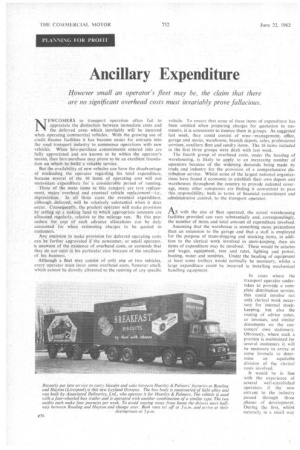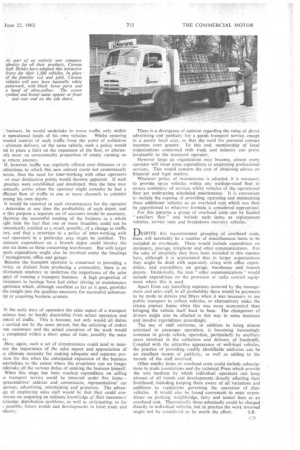Ancillary Expenditure
Page 66

Page 69

If you've noticed an error in this article please click here to report it so we can fix it.
However small an operator's fleet may be, the claim that there are no significant overhead costs must invariably prove fallacious.
N' EWCOMERS to transport operation often fail to appreciate the distinction between immediate costs and the . deferred costs which inevitably will be incurred when operating commercial vehicles. With the growing use of cedit .finance. facilities it has become easier for entrants into the road transport industry to commence operations with new vehicles. When' hire-purchase commitments entered into are fully appreciated and are known to be within the operator's means, then hire-purchase may prove to be an excellent foundation on which to:buikl a reliable service.
But the, availability of new vehicles can have the disadvantage of misleading _the .operator regarding his total expenditure. because several of the. 10 items of operating cost will not necessitate expenditure for .a considerable period of running.
Three of the main items in this category. are tyre replacement, major '.overlutul and eventual vehicle replacement—i.e., depreciation. In all three cases, the 'eventual expenditure, although deferred, will be relatively substantial when it does occur. Consequently, the prudent Operator will make Provision by' setting up a Sinking fund to which appropriate amounts are allocated regularly, relative to the mileage .run. By this procedure the cost of such advance allocations can be duly accounted _Ern when estimating charges to be quoted to
customers. . -•• – • , .
Any omission to make provision for deferred operating costs can.be further, aggravated if the newcomer, or small operator, is unaware of .the existence of overhead -costs, or contends that they' do not -exist in his particular case because of the smallness of his business.
Although a fleet may .consist of only one or two vehicles, every operator must incur some overhead costs, however small, which cannot be directly allocated to the running of any specific
vehicle. To ensure that none of these items of expenditure has been omitted when preparing charges for quotation to customers, it is convenient to itemize them in groups. As suggested last week, they could consist of nine—management, office, garage and stores, warehouse, branch depots, sales, professional services, auxiliary fleet and sundry items. The 16 items included in the first three groups were dealt with last week.
The fourth group of overhead costs, under the heading of warehousing, is likely to apply to an increasing number of• operators because of the widening demands being made by trade and industry for the provision of a comprehensive distribution service. Whilst some of the largest national organizations have found it economic to establish their own depots and warehouses throughout the ,country, to provide national coverage, many other companies are finding it convenient to. pass this responsibility, both in terms of financial commitment and
administrative .control, to the transport operator.
AS with the size of fleet operated, the actual warehousing facilities provided can vary substantially and, correspondingly,
the number of items and total amount of expenditure involved. . . Assuming that the warehouse is sornethirig more pretentious than an extension to the garage and that a staff is employed for the purpose of trans-shipping and stocking items, in addition to the clerical work involved in store-keeping, then six items, of expenditure may be involved. These would be salaries and wages, equipment, rent and rates, lighting and power, heating, water and sundries. Under the heading of equipment at least some trolleys would normally be necessary, whilst a large expenditure could be incurred in installing mechanical handling equipment.
In cases where the transport operator undertakes to provide a complete distribution service, this could involve not only clerical work necessary for internal stockkeeping, but also the issuing of advice notes, or invoices, and similar documents on the customers' own stationery. Obviously, where such a practice is maintained for several customers it will be necessary to arrive at some formula to deter mine an equitable division of the clerical costs involved.
Ft would be in line with the experience of several well-established operators if the new entrant to the industry passed through three phases of development. During the first, whilst naturally in a small way business, he would undertake to move traffic only within Le operational limits of his own vehicles. Whilst ensuring :-rsonal control of such traffic from the point of collection ultimate delivery on the same vehicle, such a policy would nd to place a limit on the expansion of the fleet, or alternately incur an unreasonable proportion of empty running on ie return journey.
If, however, traffic was regularly offered over distances or to ;stinations to which this new entrant could not economically aerate, then the need for inter-working with other operators or near destination points would become apparent. If such practice were established and developed, then the time may tentually arrive when the operator might consider he had a tfficient flow of traffic in one or more channels to consider ?ening his own depots.
It would be essential in such circumstances for the operator I determine at any time the profitability of each depot, and ir this purpose a separate set of accounts would be necessary. thervvise the successful running of the business as a whole Light hide the fact that one or more branches could not be onomically justified as a result, possibly, of a change in traffic )WS, and that a reversion to a policy of inter-working with real operators in a Particular area might be justified, The Linimum expenditure on a branch depot could involve the trne six items as those concerning warehouses. But with larger ;pots expenditure might also be involved under the headings 1 management, office and garage.
Because the transport operator is concerned in providing a trvice, as distinct from producing a commodity, there is an afortunate tendency to underrate the importance of the sales ;pcet of running a transport business. A high proportion of twcomers to haulage have had either driving or maintenance cperience which, although excellent as far as it goes, provides ttle insight into the qualities necessary for successful salesmanlip or acquiring business acumen.
N the early days of operation the sales aspect of a transport asiness may be hardly discernible from actual operation and mtrol of traffic. This is because, not only would all duties ; carried out by the same person, but the soliciting of orders 'om customers and the actual execution of the work would 2. completed within a short space of tithe, possibly the same ay.
Here again, such a set of circumstances could tend to minitin the importance of the sales aspect and appreciation of le ultimate necessity for making adequate and separate prosion for this when the anticipated expansion of the business taterializes to the extent where the proprietor can no longer ndertake all the various duties of running the business himself. When this stage has been reached expenditure on selling te transport service could be incurred under five itemsTresentatives' salaries and commission, representatives' car cpenses, advertising, entertaining and' gratuities. The advantge of employing sales staff would be that they could conmtrate on acquiring an intimate knowledge qf their customers' articular distribution problems, as well as anticipating, so far 3 possible, future trends and developments in local trade and idustry. There is a divergence of opinion regarding the value Of direct advertising and publicity for a goods transport service, except in a purely local area, so that the need for personal contact becomes even 'greater. To this end, membership of local organizations concerned with trade and industry can prove invaluable to the transport operator, • However large an organization may become, almost every operator will incur some expenditure in employing professional services. This would concern the cost of obtaining advice on 'financial and legal matters.
Whatever policy of maintenance is adopted, it is necessary to provide spare vehicles within any medium-sized fleet to ensure continuity of services whilst vehicles of the operational fleet are undergoing scheduled maintenance: It is convenient to include the expense of providing, operating and maintaining these additional vehicles as an overhead cost which can then be apportioned to whatever formula is considered appropriate'.
For this purpose a group of overhead costs can be headed " auxiliary fleet " and include, such stems as replacement vehicles, service vans and breakdown recovery. vehicks.'
•
DESPITE this recommended grouping of overhead costs, there will inevitably be a number of miscellaneous items to be included as overheads_ These would include expenditure on stationery, postage, telephone and other communications. For the sake of simplicity they have been included in this manner here, although it is appreciated that in larger organizations' they might be dealt with separately along with office expenditure, and expenditure on garage, warehouse and branch depots. Incidentally, the item other communications" would include expenditure on the provision of radio control equipment where this is used.
Apart from any travelling expenses incurred by the management and sales staff, in all probability there would be payments to be made to drivers and fitters when it was necessary to use public transport to collect vehicles, or alternatively make the returnjourney home when this was more economical than bringing the vehicle itself back to base. The changeover of drivers might also be effected in this way in some instances and involve expenditure accordingly.
The use of staff uniforms, in addition to being almost universal in passenger operation, is becoming increasingly common in goods vehicle operation, particularly by ancillary users involved in the collection and delivery of foodstuffs. Coupled with the attractive appearance of well-kept vehicles, the practice of providing readily identifiable uniforms can be an excellent means of publicity, as well as adding to the morale of the staff involved, Other sundry items of overhead costs could include subscriptions to trade associations and the technical Press which provide the sole medium by which individual operators can keep abreast of all trends and developments directly affecting their livelihood, including keeping them aware of all variations and additions to regulations governing the operation of _ their vehicles. It would also he found convenient to enter expenditure on parking, weighbridge, ferry and tunnel dues as an overhead cost. Theoretically these admittedly could be charged ' directly to individual vehicles, but in practice the work involved might not be considered to be worth the effort. S.B.












































































































